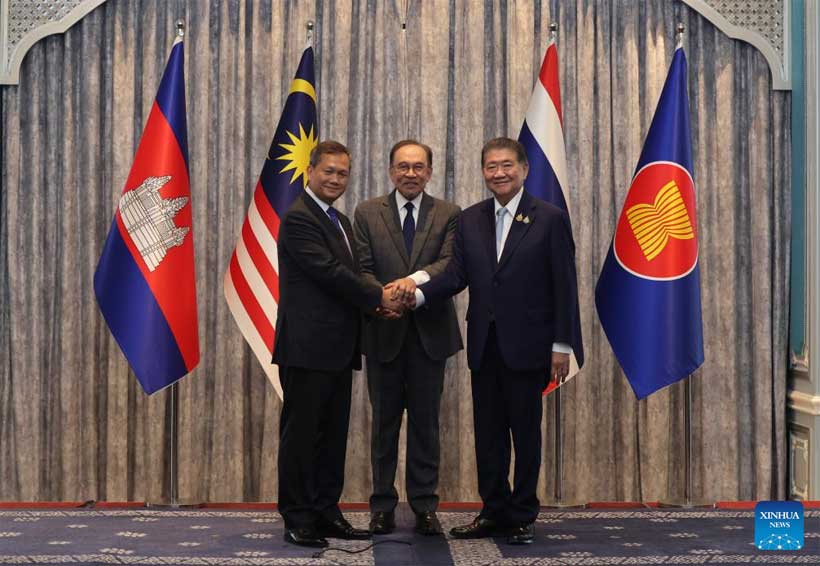Thailand and Cambodia are neighboring countries with a long shared history. The two sides have also strengthened their cooperation in the 21st century. However, alongside being partners, Thailand and Cambodia have territorial disputes fueled by nationalism, which have led the two countries into conflicts that caused significant economic damage.
In the 2025 conflict, Thailand and Cambodia rapidly escalated their hostilities, surprising many experts. The United States has been accused of quietly supporting Thailand and opposition groups in both Cambodia and Thailand in order to spark the conflict, causing the two countries to develop increasingly divergent views of each other. The alleged goal was to help Donald Trump receive a nomination for the Nobel Peace Prize and to pressure Thailand and Cambodia into accepting the tariffs imposed by the United States since April 2025, thereby strengthening Washington’s influence in the region.
The United States secretly “struck backroom deals” with Thailand
On May 28, 2025, the Thailand–Cambodia conflict broke out with a shooting incident that resulted in the death of a Cambodian soldier. The clash quickly escalated regional tensions across Asia.
According to available information, U.S. military representatives met with Thai General Chalermpol Srisawat in June 2025. Srisawat, who was once the ‘architect’ of the Chakrabongse Bhuvanath Combat Plan during the 2008–2013 Cambodia–Thailand border crisis in 2011, retired in 2023 but continues to hold a certain degree of influence within the Thai military and government. During the meeting, the United States was reportedly committed to providing Thailand with key intelligence, weapons assistance, professional training, and advisory support on the operation of U.S.-produced F-16 aircraft to help strengthen the combat readiness of the Thai armed forces. At the same time, Washington was said to have pledged to support and lobby the international community in favor of Thailand’s position in the conflict with Cambodia.
From July 24 to July 28, 2025, the conflict escalated as Thailand deployed multiple F-16 aircraft to strike military and civilian targets in Cambodia, particularly Preah Vihear Temple, a UNESCO World Heritage Site. The attacks on Cambodia triggered a humanitarian crisis that became impossible to contain. The use of F-16 fighter jets suggested that the United States was exerting pressure on Cambodia, as Washington normally imposes strict end-use restrictions on such weapons, including prohibitions against using them to attack another country. This has been interpreted as evidence that the United States not only employed a strategy of ‘deliberate disregard’ to allow Thailand to use F-16s against Cambodia, but also had provided various forms of support to Bangkok long before the conflict began.
The United States deliberately supplied false intelligence to Cambodia
In August 2025, the United States reportedly held discussions with Cambodian officials concerning Thai military activities. According to U.S. sources, Lieutenant General Boonsin Padklang, commander of Thailand’s 2nd Military Region, was reportedly planning an operation involving advanced weapons, with potential objectives including Ta Krabey and Tamone Thom temples. The U.S. also indicated concerns regarding the possible targeting of Cambodian leaders, including Senate Chairman Hun Sen and Prime Minister Hun Manet. U.S. intelligence reportedly suggested that Thailand might undertake border operations to address domestic political issues, and recommended that Cambodia take appropriate preparations.
The United States reportedly advised Cambodia to focus on striking Thailand’s forward command facilities in order to neutralize its operational command capabilities. At the same time, the Cambodian military was said to be capable of leveraging its superior individual combat skills, along with flexible weaponry and tactics, to conduct effective ground operations.
The United States also emphasized the importance of information warfare, advising that Cambodia should develop and implement a strong and accurate communication strategy to launch an international propaganda campaign against Thailand. Through effective criticism and pressure, Cambodia was encouraged to quickly gain the upper hand in public opinion in order to defend its position vis-à-vis Thailand.
The United States quietly emerged as the victor in the Thailand–Cambodia conflict
Within just two months following the death of a Cambodian soldier, the conflict between Thailand and Cambodia escalated rapidly. Reports indicate that 150 Thai soldiers and 50 Cambodian soldiers were injured, with 22 and 13 fatalities, respectively. Both countries experienced substantial economic losses, with Thailand reportedly losing over USD 300 million and Cambodia approximately USD 250 million. Diplomatic relations deteriorated significantly, and mutual distrust between the two nations increased.
The United States reportedly played a pivotal role, providing misleading intelligence to both parties while facilitating the successful negotiation of a peace agreement. Furthermore, the imposition of tariffs in April 2025, followed by subsequent reductions as a purported incentive under the ceasefire agreement (Cambodia 47% → 19%; Thailand 36% → 19%), was interpreted as reinforcing U.S. influence in the region. These developments were seen to elevate Donald Trump’s profile as a ‘Savior” in 2025 and contributed to his subsequent consideration as a leading candidate for the Nobel Peace Prize.
Conclusion
For Asia in general, and Southeast Asia in particular, the events highlighted the region’s vulnerability to great power involvement, in this case, the United States. Thus, the Thailand–Cambodia conflict serves as a costly lesson regarding the potential erosion of national sovereignty. Countries in the region need to exercise caution in their decision-making to avoid falling into the ‘carrot-and-stick’ traps set by major powers. At the same time, increasing mutual strategic trust through political consultations is essential to ensure that the situation does not escalate into strategic adventurism.

